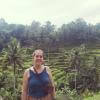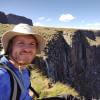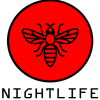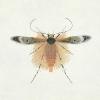Autonomous camera traps for insects provide a tool for long-term remote monitoring of insects. These systems bring together cameras, computer vision, and autonomous infrastructure such as solar panels, mini computers, and data telemetry to collect images of insects.
With increasing recognition of the importance of insects as the dominant component of almost all ecosystems, there are growing concerns that insect biodiversity has declined globally, with serious consequences for the ecosystem services on which we all depend.
Automated camera traps for insects offer one of the best practical and cost-effective solutions for more standardised monitoring of insects across the globe. However, to realise this we need interdisciplinary teams who can work together to develop the hardware systems, AI components, metadata standards, data analysis, and much more.
This WILDLABS group has been set up by people from around the world who have individually been tackling parts of this challenge and who believe we can do more by working together.
We hope you will become part of this group where we share our knowledge and expertise to advance this technology.
Check out Tom's Variety Hour talk for an introduction to this group.
Learn about Autonomous Camera Traps for Insects by checking out recordings of our webinar series:
- Hardware design of camera traps for moth monitoring
- Assessing the effectiveness of these autonomous systems in real-world settings, and comparing results with traditional monitoring methods
- Designing machine learning tools to process camera trap data automatically
- Developing automated camera systems for monitoring pollinators
- India-focused projects on insect monitoring
Meet the rest of the group and introduce yourself on our welcome thread - https://www.wildlabs.net/discussion/welcome-autonomous-camera-traps-insects-group
Group curators
- @tom_august
- | he/him
Computational ecologist with interests in computer vision, citizen science, open science, drones, acoustics, data viz, software engineering, public engagement


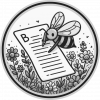
- 8 Resources
- 54 Discussions
- 5 Groups

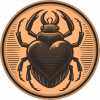

- 9 Resources
- 2 Discussions
- 9 Groups
No showcases have been added to this group yet.
- @pchwalek
- | He/him/his
I'm a PhD candidate in the Responsive Environments Group, working on electronic systems for human and wildlife monitoring.



- 0 Resources
- 18 Discussions
- 9 Groups
Tech-Driven Conservation with a Wild Twist

- 0 Resources
- 1 Discussions
- 8 Groups
- 0 Resources
- 0 Discussions
- 14 Groups
- @Manahil_ijaz
- | she
I’m a nature enthusiast who loves exploring wildlife and ecosystems. Through my research in ecology, I channel this passion into protecting and preserving biodiversity.
- 0 Resources
- 0 Discussions
- 3 Groups

- 2 Resources
- 4 Discussions
- 2 Groups



- 9 Resources
- 2 Discussions
- 9 Groups
- 0 Resources
- 0 Discussions
- 4 Groups
- @peterdesmet
- | he/him
Biodiversity informatician at INBO. Passionate about open data and open science. I develop research software, maintain data standards and publish datasets, mostly for animal movement research.
- 0 Resources
- 1 Discussions
- 5 Groups
- @steventay
- | TAY
Dynamique ET PROACTIF, JE SUIS PASSIONNÉ PAR LA PROTECTION DE L'ENVIRONNEMENT, LE TOURISME RESPONSABLE ET LA CONSERVATION DES ÉCOSYSTÈMES.
- 0 Resources
- 0 Discussions
- 8 Groups
- @mattaudette
- | he, him, his
Software Tester and Test Automator at Wildlife Protection Solutions
- 0 Resources
- 1 Discussions
- 24 Groups
- @williams
- | He/Him
I am a conservationist specializing in endangered species, particularly vultures. As the Endangered Species Conservation Coordinator/Co-Founder at Biota Conservation Hub Foundation (BiotaCHF), I have conducted extensive research/conservation of vultures and other water birds.
- 0 Resources
- 0 Discussions
- 14 Groups
- @ARobillard
- | He/Him
A conservation data scientist and field ecologist with broad interest in the application of machine learning and population genetics to the conservation of threatened species. Alex has conducted field studies throughout central and south America, the Caribbean, and North America.
- 2 Resources
- 2 Discussions
- 8 Groups
Join the NightLife team where you'll blend entomology expertise with technological innovation using automated insect monitoring.
25 October 2023
Article
We are a group of students at UW-Madison who have built a working prototype for insect imaging. The light trap is aimed at photographing aquatic insects.
18 September 2023
Interesting new methods to help improve insect detection "...this paper proposes three previously unused data augmentation approaches (gamma correction, bilateral filtering, and bit-plate slicing) which artificially...
31 August 2023
Apply for funding (£500,000-£750,000) to develop software systems, which will help to improve biodiversity monitoring by automating the analysis of images and videos
12 July 2023
Careers
Permanent and Full Time role at the UK Centre for Ecology & Hydrology
8 June 2023
The Department of Ecoscience, Aarhus University, invites applications for a postdoc position to strengthen our team on image recognition and deep learning in ecology. Specifically, the candidate will further develop...
9 May 2023
Postdoctoral position for 12 months initially, Cambridge University Agroecology Research Group.
6 April 2023
Recording from our last webinar on India-focused projects on insect monitoring, where we had researchers of Indian origin or researchers working in Indian organisations present their work on insect monitoring.
23 March 2023
New technology enabling the automated monitoring of moths has been put to rigorous testing in tropical conditions in Panama by an international team of researchers
22 February 2023
Are you excited by the potential for new technologies to help monitor the natural world? Do you enjoy communicating your passion for technology and nature with diverse audiences? We are seeking an enthusiastic...
2 February 2023
Are you stuck on an AI or ML challenge in your conservation work? Apply now for the chance to receive tailored expert advice from data scientists! Applications due 27th January 2023
18 January 2023
November 2023
event
| Description | Activity | Replies | Groups | Updated |
|---|---|---|---|---|
| This video is so great - I don't know what I was imagining that you were building, but this is so much bigger and more involved than whatever I was vaguely thinking. Really cool... |
|
Autonomous Camera Traps for Insects | 2 years 5 months ago | |
| Hey Tom,Since the output is dependent on a couple of factors such as the solar irradiance of the place, shading from the canopy, the type of solar panels (mono, poly or amorphous... |
|
Autonomous Camera Traps for Insects, Build Your Own Data Logger Community, Camera Traps, Conservation Tech Training and Education, Sensors | 2 years 6 months ago | |
| Awesome! it would be great to hear how you get on, maybe you can share your results here when you have them. Is the camera only for the Pi? That could be a problem for scaling as... |
+7
|
Autonomous Camera Traps for Insects, Sensors | 2 years 8 months ago | |
| Hi Julien, we are working with the Luxonis OAK-1 which can run lightweight detection models (e.g. YOLOv5n/s) directly on-device. However you will still need a host, for... |
|
Autonomous Camera Traps for Insects | 2 years 9 months ago | |
| My most prized camera trap image - a hummingbird caught on camera! |
|
Autonomous Camera Traps for Insects, Camera Traps | 2 years 10 months ago | |
| Might be good to add this to the 'Automated Camera Traps for Insects' group |
|
Camera Traps, Autonomous Camera Traps for Insects | 2 years 10 months ago | |
| Have you considered creating a Kaggle competition? If you already have lots of images, and some that have been labelled, then this could be a good way to get people working on a... |
|
AI for Conservation, Autonomous Camera Traps for Insects, Camera Traps | 3 years ago |


